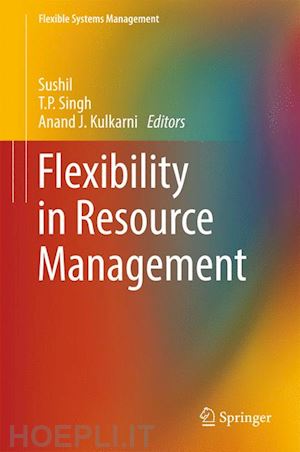
Questo prodotto usufruisce delle SPEDIZIONI GRATIS
selezionando l'opzione Corriere Veloce in fase di ordine.
Pagabile anche con Carta della cultura giovani e del merito, 18App Bonus Cultura e Carta del Docente
This book provides a conceptual ‘Flexibility in Resource Management’ framework supported by research/case applications in various related areas. It links and integrates the flexibility aspect with resource management to offer a fresh perspective, since flexibility in different levels of resource management is emerging as a key concern -- a business enterprise needs to have reactive flexibility (as adaptiveness and responsiveness) to cope with the changing and uncertain business environment. It may also endeavor to intentionally create flexibility by way of leadership change, re-engineering, innovation in products and processes, use of information and communication technology, and so on.
The selected papers discussing a variety of issues concerning flexibility in resource management, are organized into following four parts: flexibility and innovation; flexibility in organizational management; operations and technology management; and financial and risk management. In addition to addressing the organizational needs of corporate bodies spread across the globe, the book serves as a useful reference resource for a variety of audiences including management students, researchers, business managers, consultants and professional institutes.Prof. Sushil is Abdulaziz Alsagar Chair Professor (Professor of Strategic, Flexible Systems and Technology Management), and chair of the Strategic Management Group at the Department of Management Studies, Indian Institute of Technology Delhi. He has served as a visiting professor and held seminars at many leading universities, including the University of Minnesota, Minneapolis, MN, Stevens Institute of Technology, NJ, University of Lethbridge, Alberta, Université Paris 1 Panthéon-Sorbonne, Paris, to name just a few. He is an active researcher with over 300 papers in various refereed journals and conferences and 20 books in the areas of flexibility, strategy, systems thinking, and technology management to his credit. He has pioneered the area of “flexible systems management” and made original contributions to the field of knowledge in the form of interpretive approaches in management. He is the founder editor-in-chief of Global Journal of Flexible Systems Management and s
erves on the editorial boards of leading international journals. He is the founder president of the professional body, “Global Institute of Flexible Systems Management.” He has acted as a consultant to both governmental and industrial organizations. He served as independent director on the boards of Rashtriya Ispat Nigam Ltd (RINL) and the Hospital Services Consultancy Corporation Limited (HSCC).Dr. Tejinder Paul Singh, dean of the Faculty of Engineering and Director Symbiosis Institute of Technology, Symbiosis International University, Pune, India completed his graduate degree in Mechanical Engineering in 1978, his masters in Industrial Engineering in 1989 and Ph.D in Engineering in 1994, all at the prestigious Thapar University, Patiala, India. He has more than 27 years of teaching and research experience and 10 years of industrial experience. He has held the positions of professor and head of the Mechanical Engineering Department, dean of academic affairs, dean
resource planning and generation, director of the CII-TDB-T NET and acting director of Thapar University, Patiala. In industry, Dr. Singh has worked in maintenance, production and inspection functions and has been involved in various projects related to product development and process improvements. He has a large number of publications in peer-reviewed international and national journals. He has also presented papers in conferences at both international and national levels and has also been actively engaged in consultancy and sponsored research and development (R & D) projects. His areas of interest are quality systems, total quality management, lean systems, waste minimization and Six Sigma. Anand J. Kulkarni holds a Ph.D in Distributed Optimization from Nanyang Technological University, Singapore, MS in Artificial Intelligence from University of Regina, Canada, Bachelor of Engineering from Shivaji University, India and Diploma from the Board of Technical Education, Mumbai. He worked as a research fellow on a cross-border supply-chain disruption project at Odette School of Business, University of Windsor, Canada. Currently, he is working as an assistant professor at the Symbiosis Institute of Technology, Symbiosis International University, Pune, India. His research interests include optimization algorithms, multi-objective optimization, continuous, discrete and combinatorial optimization, multi-agent systems, complex systems, cohort intelligence, probability collectives, swarm optimization, game theory, self-organizing systems and fault-tolerant systems. He is the founder and chairman of the Optimization and Agent Technology (OAT) Research Lab. Anand has published over 30 research papers in peer-reviewed journals and conferences.










Il sito utilizza cookie ed altri strumenti di tracciamento che raccolgono informazioni dal dispositivo dell’utente. Oltre ai cookie tecnici ed analitici aggregati, strettamente necessari per il funzionamento di questo sito web, previo consenso dell’utente possono essere installati cookie di profilazione e marketing e cookie dei social media. Cliccando su “Accetto tutti i cookie” saranno attivate tutte le categorie di cookie. Per accettare solo deterninate categorie di cookie, cliccare invece su “Impostazioni cookie”. Chiudendo il banner o continuando a navigare saranno installati solo cookie tecnici. Per maggiori dettagli, consultare la Cookie Policy.